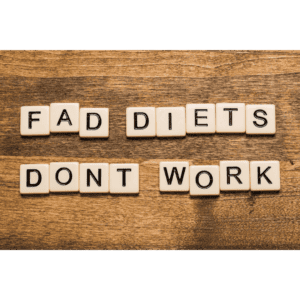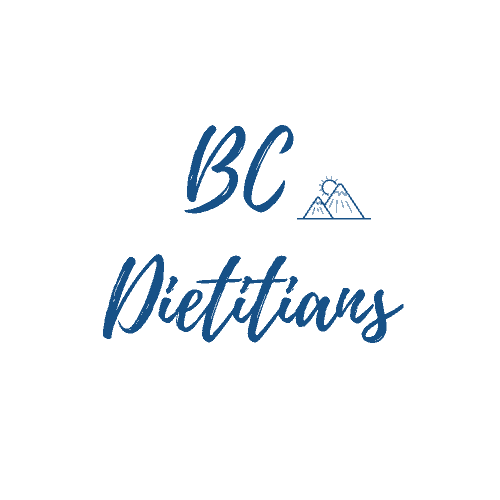Do you often find yourself committed to various diets or plans, yet your weight remains stagnant, or worse, keep on increasing?
You’re not alone.
But if you understand some of the common weight loss roadblocks to success, you may be able to see the results of your hard work!
In this blog post, I’ll share 7 of the most common weight loss roadblocks that I see in my practice.
Read on for hope, motivation, and 7 easy tweaks that will jumpstart your journey towards a healthier version of yourself.

Caroline Spurr
As a weight neutral and client-centered dietitian, my priority is ensuring my clients feel good about the changes we are making together. So, know that you are not obligated to lose weight if you do not want to!
That being said, I understand how frustrating it can be when you are putting in the effort to make intentional changes to your diet and activity, yet not seeing the results you desire.
This is why I want to shed light on 7 common weight loss roadblocks that may be hindering your progress. By identifying and addressing these roadblocks, we can work towards achieving your goals in a way that feels supportive and empowering.
Let’s address these obstacles together, and help you feel your best self.
# 1 : Mindless Dieting
It is similar to being a mindless eater but a mindless dieter is someone who:
- Gets caught up in the “excitement” of a new diet (shiny object syndrome) and hops on every new diet trend but struggles to stick with any of them
- Tends to start another diet without addressing habits and limiting self-beliefs that are key for success
You may recognize this if you have:
- Tried every supplement out there without changing your habit
- Quit during plateaus or before you see results
It can be tough to stop being a mindless dieter but this is why I help my clients improve their awareness of their beliefs, habits, environment, & thought patterns and build a strong foundation before moving on to results.
One tip to move past mindless dieting is to alter your social media activity or unfollow diet accounts to prevent yourself from being shown more ads by the social media’s algorithm.
If you are struggling to commit to a lifestyle change, connect with a dietitian.
# 2 : All or Nothing Attitude Towards Food

Polarized thinking is a tendency to think in extremes.
It is all or nothing, perfect or failure, good or bad, and always or never.
It’s normal to have black and white thoughts but only to an extent. BUT it can stop you from seeing how complex and nuanced everything is in life.
This mindset can get in the way of your career, health, and relationships! You can also miss out on recognizing and celebrating your hard work, progress, and growth along the way!
The problem with an all or nothing diet mentality is that it makes you become overly restrictive in your diet and eating habits.
When you inevitably give in to a craving, you may overindulge, leading to guilt and emotional eating. If you find yourself swinging between being on a new diet or eating plan then being “off the wagon”, you may have an all or nothing attitude towards food.
For example, you miss a workout so you order a pizza instead of eating the food you prepped at home because “the day is ruined” or you’ve labelled yourself a “failure” who will “never” get better.
Or, you have worked very hard at getting your weight down and you were meeting your goals but your weight plateaus for a couple of weeks. Soon you think “what’s the point” of all your hard work and quit the plan you were on.
How to stop all or nothing thinking
In order for you to find some balance, learning to embrace the grey or nuance is very important. It can seem extremely overwhelming but having a Dietitian who understands behaviour change is HUGE.
Instead of aiming for perfection, try and focus on your overall journey’s progress, and remember that small changes do make significant differences over time.
My clients have found success by tracking their thoughts along with their food journal to build more awareness of their eating or restriction triggers.
# 3 : Chaotic and Mindless Eaters
Chaotic eating is a pattern that I see often with clients who are struggling to reach or maintain their nutrition goals.
A lot of my clients who have struggled with chaotic eating told me that they felt like they have dieted for years or tried everything under the sun but no result would ever stick! It usually erodes their confidence in themselves that this is something they can achieve. ⠀
Signs of a chaotic eater include:
- Rarely has a plan for meals or groceries at home
- Too busy to eat throughout the day
- Cannot recognize gentle cues of hunger or fullness such as you can only recognize full as “stuffed’
- Unaware of thoughts, events, and beliefs that lead to eating or cravings
- Difficult to remember what you ate throughout the day or night
Snacking is not bad nor do you have to eat a certain number of meals each day to lose weight but if you eat >6 times a day, you may be a grazer.
Grazing throughout the day or night can cause you to eat larger amounts of food without being aware of it which may hurt your progress.
People usually snack while multitasking which makes remembering what you have eaten even harder!
How to Stop Mindless Eating
There are a few ways to stop mindless eating and many of my clients have found success with at least one of these strategies:
- Create eating zones in your home or office where you are “not allowed” to eat anywhere else to cut down on eating mindlessly. For example, your eating zones could be the kitchen table or island at home and the office breakroom at work!
- Slow down while eating by putting your utensil or food down in between each bite.
How to become a different type of eater
My clients have found meal planning and prepping to been the key to prevent chaotic eating!
Now meal planning or prepping does mean you have to batch cook 1 meal and eat it until you feel disgusted by the mere thought of the dish! Check out our other blog posts on meal planning and prepping to get more ideas.
# 4 : Underestimating Your Portions
Most of us believe that the amount of food we eat is far less than we are actually eating.
On average, people tend to underestimate their calorie intake by 500 per day, which over time can lead to a significant plateau in your progress.
I am not saying that a calorie is a calorie nor that there aren’t a lot of health or performance benefits to eating minimally processed foods. What I am saying is that most humans, including myself, generally suck at estimating food portions! For example, I have no business eyeballing olive oil as I pour it into a pan!
Also, if you are a chaotic eater, emotional eater, or mindless eater, you are likely missing more food than you think!
To combat this, try tracking your food intake using a food journal or an app.
This can help you become more aware of what you’re eating and can help you make more mindful choices. Instead of guessing, try tracking your food for a week and see which foods you are better at estimating than others.
You don’t have to weigh and track everything you eat – you could only weigh or track the foods you are less accurate at estimating.
# 5 : Eating for Comfort or Emotional Eating
Are you an emotional eater?
When stress or anxiety hits, it’s easy for any of us to turn to higher sugar or fat foods as a coping mechanism.
Eating for comfort isn’t always “bad” but if it is your primary coping mechanism, you may have a harder time reaching your goals AND improving your mental health since food is only a temporary solution for your feelings.
Check out our other blog posts on emotional eating to learn more about the different triggers for comfort eating.
If you find yourself turning to food when you’re feeling stressed, sad, or bored, try finding alternative coping mechanisms.
This could be anything from going for a walk, practicing yoga or meditation, to calling a friend or taking a relaxing bath.
Finding healthy ways to manage your emotions can help you avoid turning to food for comfort. In these situations, it’s best to have a list of alternative coping mechanisms that don’t involve eating such as exercise, meditating, or calling a friend.
# 6 : Most of Your Time is Spent Seated
Do you spend too much time in front of a computer or TV?
Both our daily activities of life and planned exercise impact how many calories we need to maintain our weight.
Unlike the calories we eat, most people tend to overestimate the amount of activity they do which can impact calorie targets that they set for themselves. Even if you go to the gym but most of your day or night is spent sitting, you may be overestimating the activity you do!
To combat a sedentary lifestyle, try incorporating more movement into your daily routine.
This could be as simple as taking the stairs instead of the elevator, going for a walk on your lunch break, or doing a quick workout video before starting your day.
One of my clients has started a walking group at work; they all go at lunch!
# 7 : Calorie Deficit for Too Long

While being in a calorie deficit is vital for weight loss, staying in one for too long can be detrimental, especially if you have been eating below your BMR (basal metabolic rate).
Calorie reduction slows down the metabolism, and prolonged calorie deficit can lead to muscle loss, which can negatively affect weight loss progress. Note that some of my clients have thought they were in a caloric deficit for too long but they were a chaotic eater or mindless eater instead.
A diet break is where you increase your calories to maintenance calorie needs.
Diet breaks are a newer area of research and while it is not magical, it can provide some relief from being in a calorie deficit for too long especially for the psychologically.
While most studies have shown that diet breaks are not magical, it has shown some psychological benefits where most study participants had lower levels of hunger, more satisfaction after eating, lower irritability, and more alertness!
There are a couple models in the research such as 5 days in a deficit and 2 day diet breaks but I am a fan of the longer diet breaks (7-14 days every 8 weeks), especially for those who are already relatively lean or who have been dieting for a long time.
The biggest thing I have seen as barriers for diet breaks are:
- It is always hard to get used to a deficit so you might have a harder time (hunger levels, lower energy, irritability, and changing food habits) returning to lower calories each time.
- You are scared of increasing calories, especially if you have a history of binging or yo-yo dieting. Totally fair!
- If your relationship with food is shaky, you will likely have a harder time on the diet break. Having a coach who can help you improve your relationship with food first and gently guide you would be very important during this time!
And here’s where one of my biggest things I stress comes in: consistency.
It really is a key to success in multiple facets of life. And… my other big thing: working on the foundation.
Most of my clients want to skip straight to the results phase without working on the foundation (which is fair). BUT – if you don’t work on the habits, on the foundation, on nailing the consistency and the showing up part, you are more likely to regain the weight.
I am passionate about helping my clients produce transformations, not temporary successes! If my program doesn’t help you with these habits or recover from the results, how is my program any different than a fad diet? Let me tell you, I ain’t about that life.
I became a Dietitian to produce long-term changes. I have worked with so many clients who feel like they have “failed” time and time again. But it isn’t their fault, it was the plan and it did not addressing the underlying pieces!
Oh and the whole point of my program? It will be the last plan you’ll ever need.
As always, if you have questions about my plans and what they’re like, you can always reach out!
You can also feel free to check out the page I made to address questions and set expectations, even before the discovery call stage, right here: What to Expect.








Add a comment